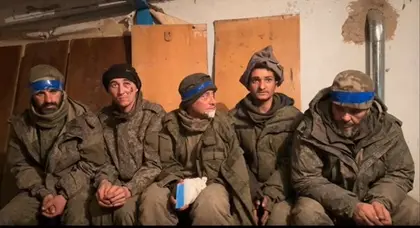Just days after reports of the deaths of Nepalese volunteers fighting in Ukraine appeared, the Kathmandu authorities arrested a gang responsible for recruiting its youth for the Russian army.
Kathmandu also believes Nepalese nationals are illegally serving with both Ukrainian and Russian forces in Russia’s war in Ukraine.
JOIN US ON TELEGRAM
Follow our coverage of the war on the @Kyivpost_official.
On Tuesday Kyiv Post reported on the death of six Nepalese mercenaries fighting for Russian forces in Ukraine, with another captured by Kyiv’s forces. The government in Kathmandu urged Moscow to stop recruiting its citizens, to send any serving men home and to repatriate the bodies of those who had died.
Nepal prohibits its citizens from joining foreign armies, except where there is a formal agreement, such as it has with Britain and India, which ensures those recruited are trained and treated to appropriate levels both during and after service. There is no such agreement with Russia, who receives its volunteers through “agents” working in Nepal.
The Nepalese government had issued an official warning in August against its citizens engaging in military or security-related work in war-torn countries.
Nepalese police have acted against a gang that is involved in the illegal smuggling of people to Russia over the past week. The police team arrested 12 individuals from various locations in Kathmandu.
According to Kathmandu district police chief Bhupendra Khatri, the gang charged unemployed youths up to $9,000, with the promise of travel visas and employment abroad.

1,100 North Korean Casualties in Russia-Ukraine War: Seoul
The visas provided were simply “tourist visas” for such destinations as India and the United Arab Emirates where the young men were coerced into volunteering for the Russian army and then forced to fight in Ukraine.
“It is a case of human smuggling… organized crime,” Khatri added.
The Nepal-based, English language news site, My Republica, cited a police source who named those arrested as Dipen Pariyar, Kshitij Giri, Subhash Lama, Manish Neupane, Rosal Maharjan, Hari Bahadur Bishwakarma, Ishwar Adhikari, Gokarna Aryal, Sujata Dahal, Santosh Adhikari, Santosh Nepal and Drona Dangi.
The source said that the arrested individuals were engaged not only in recruiting but also in the preparation of documentation and arranging visit visas. The police officer said, “The number of arrests will increase in a few days.”
On Tuesday a spokesperson said it believed that Nepalese nationals are serving with both Ukrainian and Russian forces but was unable to confirm how many were involved. While Milan Raj Tuladhar, Nepal’s ambassador to Russia said that he believed that as many as 200 Nepalese nationals were serving in the Russian army as mercenaries.
My Republica quoted another police officer who said “If you go to the Russian Embassy in the afternoon, you will see a huge crowd of Nepalis. That’s all the gang’s work. We are trying to reach the leader of the gang.”
Many Nepalese take employment abroad with the money they earn being crucial to Nepal's economy. In 2022 it was estimated that this represented over a quarter of its GDP, according to World Bank figures.
Nepal has a long tradition of providing soldiers for the British and Indian armies based on long-standing formal agreements. Nepalese men have served with the British Army since 1815 as “British Gurkhas,” with India carrying on the tradition after independence and the “Gurkha Contingent” has served with the Singapore Police since 1949.
Nepal is also currently the second largest troops-contributing country for United Nations Peacekeeping Forces in a number of missions around the world. There are also reports of Nepalese volunteers serving with the French foreign legion and even the US army as well as filling security and landmine clearance posts in the Middle East and Africa.
You can also highlight the text and press Ctrl + Enter






